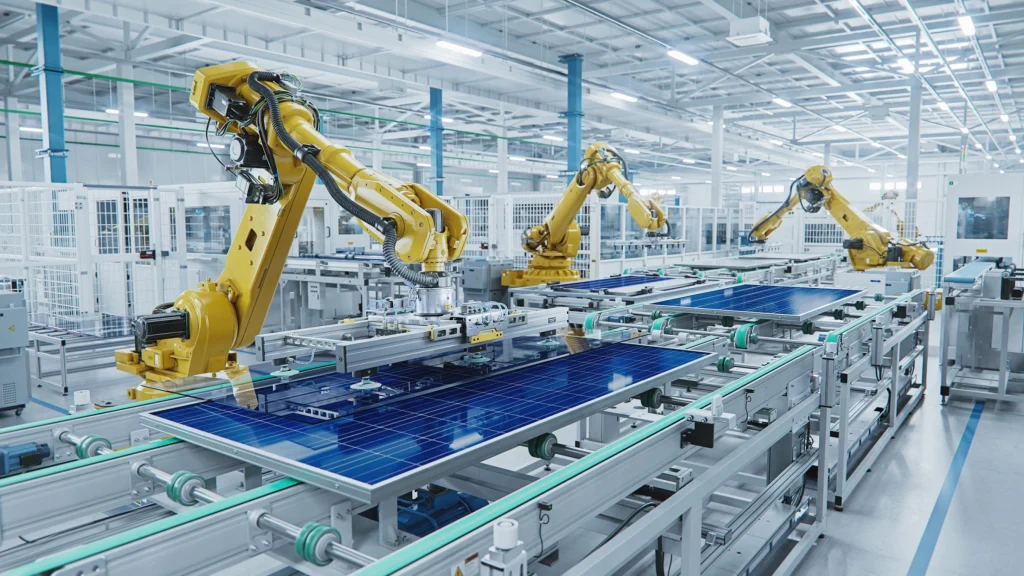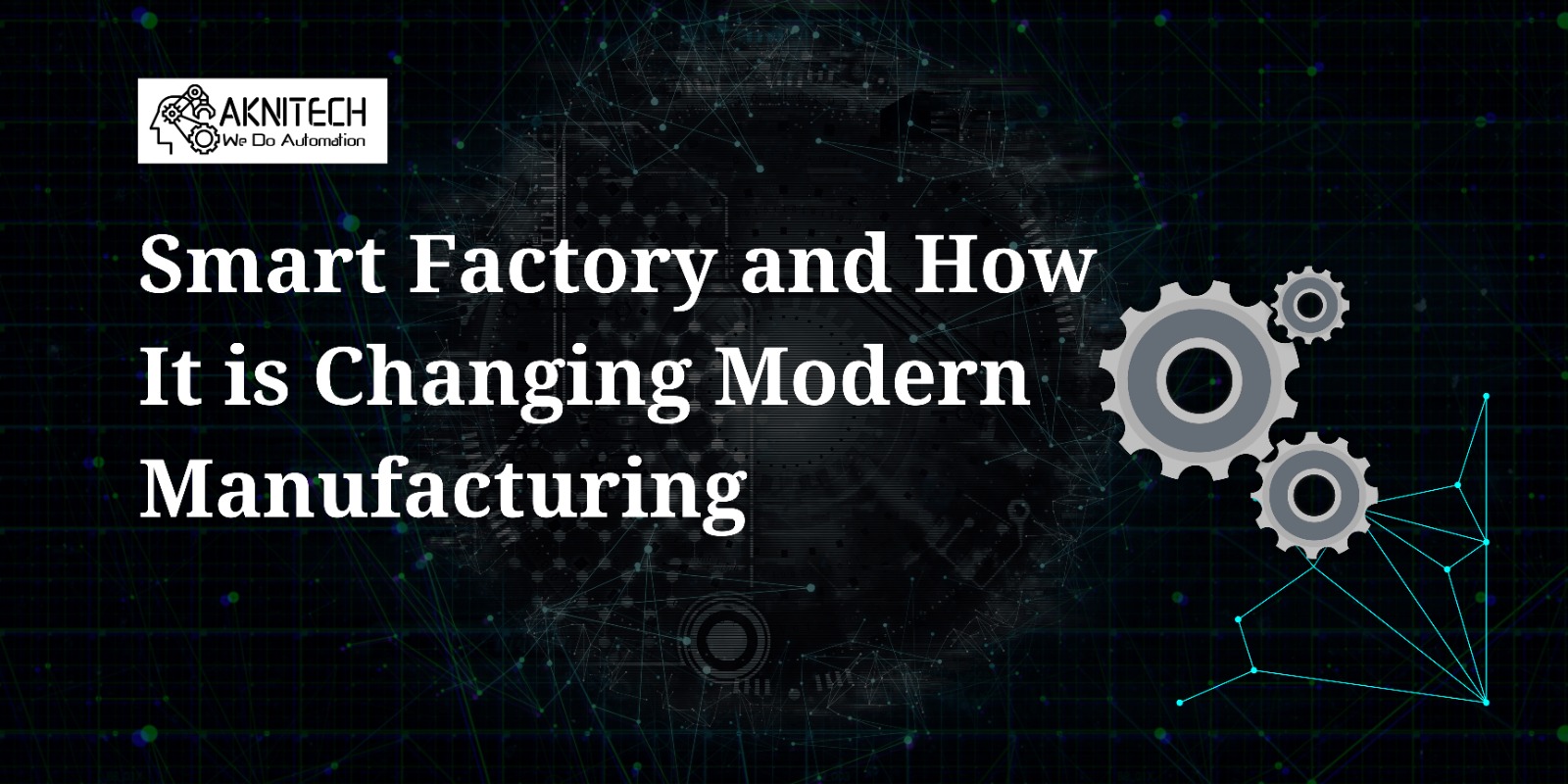Manufacturing industries are undergoing a major transformation with the rise of smart factories. These advanced production environments integrate IoT, artificial intelligence, robotics, and real-time data analytics to enhance efficiency, reduce costs, and improve overall productivity. Industrial automation plays a key role in this transition, enabling businesses to streamline operations, minimize human intervention, and optimize resource utilization.
Aknitech Automation specializes in providing cutting-edge solutions for smart factories by integrating real-time monitoring, predictive maintenance, and cloud connectivity. By leveraging IoT-driven automation, industries can reduce downtime, enhance decision-making, and achieve greater production flexibility.
This blog explores how smart factory solutions powered by connected technologies are revolutionizing manufacturing and why businesses must adopt automation strategies to stay competitive.
What is a Smart Factory?
A smart factory is an interconnected, highly automated production environment that leverages data from sensors, IoT-enabled devices, and AI-powered analytics to optimize operations. Unlike traditional factories, where manual intervention and reactive maintenance are common, smart factories rely on predictive analytics, machine learning, and real-time insights to enhance efficiency.
Smart factories feature:
- Real-time data collection for process optimization
- AI-driven analytics for predictive maintenance
- Automated quality control systems
- Robotics and autonomous machinery for precision manufacturing
- Cloud-based connectivity for remote monitoring and decision-making
These technologies work together to create a seamless, efficient, and agile manufacturing ecosystem that minimizes waste, maximizes productivity, and enhances operational flexibility.
How IoT is Driving Industrial Automation
1. Real-Time Monitoring and Data Analytics
One of the most significant advantages of IoT-driven automation is real-time monitoring. IoT sensors collect data from machines, production lines, and supply chains, providing instant insights into operational performance. This allows businesses to:
- Detect potential failures before they cause downtime
- Optimize machine efficiency by analyzing energy consumption
- Improve overall production quality with automated analytics
By integrating IoT-based monitoring systems, manufacturers can shift from reactive to proactive maintenance strategies, significantly reducing operational disruptions.
2. Predictive Maintenance for Reduced Downtime
Traditional manufacturing relies on scheduled maintenance, which can be inefficient and costly. IoT-enabled predictive maintenance leverages real-time data to detect early warning signs of machine failure. This approach:
- Prevents unplanned shutdowns
- Extends equipment lifespan
- Reduces maintenance costs and increases overall efficiency
By utilizing machine learning models, manufacturers can analyze sensor data to predict failures, schedule maintenance at optimal times, and minimize unnecessary servicing.
3. Robotics and AI-Enabled Automation
Automation in smart factories is significantly enhanced by AI-driven robotics. These intelligent machines work alongside human operators to perform repetitive, labor-intensive tasks with greater precision and consistency. AI-enabled robots can:
- Handle high-speed assembly processes
- Perform quality inspections with advanced vision systems
- Operate 24/7 without fatigue, increasing productivity
By integrating robotics with IoT-enabled automation systems, businesses can enhance production rates, reduce human errors, and lower labor costs.
4. Cloud Connectivity for Remote Operations
Smart factories are increasingly adopting cloud-based platforms to manage production remotely. Cloud computing provides:
- Centralized access to real-time production data
- Seamless integration between different manufacturing sites
- AI-driven insights for process optimization
Aknitech Automation implements cloud-based industrial solutions that enable manufacturers to monitor and control production from any location, ensuring seamless collaboration between different facilities and suppliers.
5. Supply Chain Optimization and Inventory Management
IoT-enabled automation enhances supply chain efficiency by providing end-to-end visibility of material flow, inventory levels, and logistics. Smart factories use connected devices to:
- Track shipments in real-time
- Automate stock replenishment based on demand patterns
- Reduce waste by optimizing production schedules
With IoT-driven supply chain automation, businesses can achieve better forecasting accuracy, minimize material shortages, and prevent overproduction.
6. Smart Energy Management for Cost Reduction
Energy consumption is a major operational cost in manufacturing. IoT-enabled industrial automation helps optimize energy usage by:
- Identifying energy inefficiencies in machines
- Automating lighting, heating, and cooling systems
- Monitoring power consumption in real-time
By integrating smart energy management solutions, manufacturers can reduce costs while meeting sustainability goals and regulatory compliance requirements.
Key Benefits of Smart Factory Solutions
- Increased Efficiency – Real-time analytics and predictive automation optimize workflows, reducing operational inefficiencies.
- Cost Reduction – Lower maintenance, labor, and energy costs improve profit margins.
- Improved Product Quality – Automated quality control minimizes defects and enhances consistency.
- Enhanced Safety – IoT-powered monitoring systems prevent workplace hazards and ensure regulatory compliance.
- Greater Flexibility – Adaptive automation systems allow manufacturers to scale production based on market demand.
Industries Benefiting from Smart Factory Solutions

Automotive Manufacturing
Automakers use IoT-driven automation for precision assembly, real-time defect detection, and AI-powered robotics to streamline production.
Electronics and Semiconductor Industry
Smart factory solutions enable high-precision manufacturing, automated testing, and predictive analytics to enhance efficiency and reduce defects.
Pharmaceutical and Healthcare Manufacturing
IoT-based automation ensures compliance with safety standards, real-time monitoring of drug production, and automated packaging systems.
Food and Beverage Industry
Smart factories use AI-powered quality control, IoT-enabled refrigeration monitoring, and automated food processing for higher efficiency.
Textile and Apparel Industry
IoT-powered automation enhances fabric quality inspection, supply chain optimization, and robotic sewing machines for customized production.
How Aknitech Automation is Transforming Industrial Automation
Aknitech Automation provides industry-leading smart factory solutions that integrate IoT, cloud computing, AI-driven analytics, and predictive maintenance. With expertise in industrial automation, Aknitech Automation helps businesses:
- Deploy IoT-enabled predictive maintenance systems
- Integrate cloud-based automation platforms for remote monitoring
- Implement AI-powered robotics for improved production efficiency
- Enhance cybersecurity for connected industrial systems
By adopting advanced industrial automation strategies, businesses can increase efficiency, reduce operational costs, and stay ahead in the competitive manufacturing landscape.
Conclusion
Smart factory solutions are revolutionizing industrial automation by leveraging IoT, AI, and cloud computing. Businesses that embrace digital transformation can enhance productivity, minimize costs, and optimize resource allocation. With real-time monitoring, predictive maintenance, and AI-driven automation, manufacturers can create more efficient, flexible, and scalable production environments.
Aknitech Automation provides innovative smart factory solutions tailored to industry needs, ensuring a seamless transition to IoT-driven industrial automation. As manufacturing continues to evolve, companies that adopt smart technologies will gain a competitive advantage in the global market.







